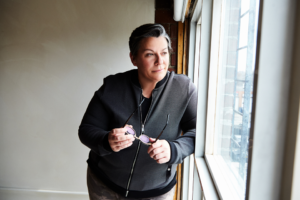
Women in skilled trades: stigma and sexism must be addressed
By Mandy Rennehan
Construction Labour Leadership Skills Development Women in ConstructionWomen in Construction week, March 5 to 11, acknowledges and celebrates women in the trades, but gender based violence, discrimination and pay inequity are keeping numbers from growing.

HGTV host, CEO of Freshco.ca and author of The Blue Collar CEO, Mandy Rennehan. (Photo by Jen Squires)
It is estimated that by 2025, 20 per cent of all jobs in North America will be in the skilled trades sector. The warning light around this subject has been bright for years, but not as blinding as it needs to be. If we don’t get more people to consider the skilled trades as a viable profession, and fast, we will face more crippling labour shortages that will grind the economy to a halt.
As half of the workforce, women are an untapped resource that could help solve this problem, but the numbers tell a disheartening story. Despite government and industry wide efforts to attract more women to the profession, we account for only seven per cent of the entire skilled trades labour force in Canada. The numbers in the United States aren’t any better, with less than four per cent of women working in trades. Even more disheartening: most of those jobs are in administrative or management positions. Less than four per cent of women in the trades work on-site jobs, such as bricklaying or carpentry.
I travel the world speaking to people about the wealth of opportunities available to them in the skilled trades. Everywhere I go, I encounter women who are excited and eager to join the field. The problem is not that women don’t want to be in this industry. The problem is we aren’t doing enough to ensure their safety and success while they’re in it.
We’ve come a long way since I was a young woman in construction, and for the most part my experience in the field has been positive. But the barriers and biases women face are persistent, and can present themselves in many ways. It can be an offhand comment about your appearance or physical ability. It can be overt sexual harassment. It can be an unsafe situation, like when women are not provided PPE that actually fits. It can also be more subtle, like being assigned to a task well below your ability and experience, or a paycheque a few dollars short of your male coworkers.
The industry response to these types of behaviours and barriers has mostly been reactive: offer condolences to the women affected, and reprimand the offenders responsible. This helps no one.
If we truly want more women in the skilled trades, we need to educate people on a scale that has never been seen before – and rebuild the industry from the top down into a safe, supportive and welcoming space for all.
Employers and supervisors need to educate their workforce, establish clear zero-tolerance policies, and promote a culture of respect, inclusivity and opportunity.
Teachers need to initiate stronger, more meaningful dialogue with their students about ALL of the career options available to them.
Parents need to have real conversations with their kids that dispel the sexist stereotypes and harmful stigmas surrounding the skilled trades.
More people like me who have a platform and a voice, also need to get louder about these issues. For every post about paint colours and kitchen islands, there should be one about steel toe boots and what it’s like to wield a jackhammer.
During Women in Construction Week, March 5 to 11, I hope we do more than celebrate the accomplishments of women like myself who have achieved success in construction and instead find ways to take more women with us to the top.
Because seven per cent is not a number I can live with, knowing we can do so much better.
-Mandy Rennehan
Mandy appears on HGTV’s Trading Up with Mandy Rennehan. Her book, The Blue Collar CEO, is available through Harper Collins Publishers. She is a passionate trade industry ambassador, and the CEO and founder of Freshco.ca, a construction and facilities firm whose clients include The Gap, Tesla, Nike and Apple.




